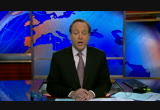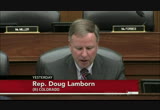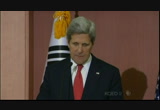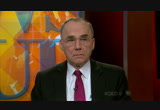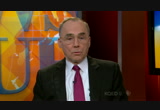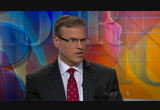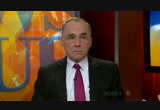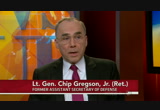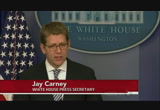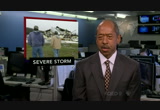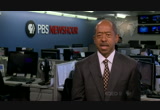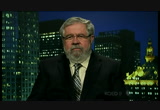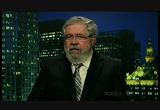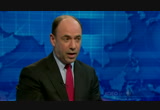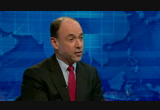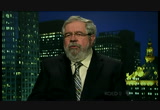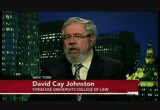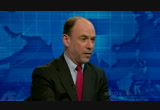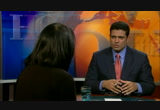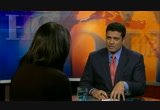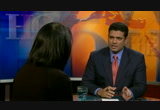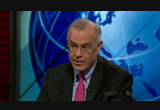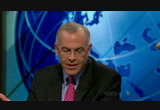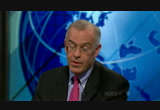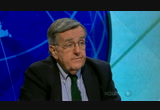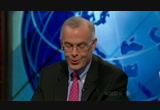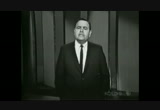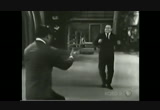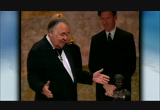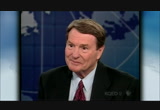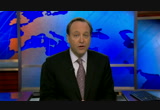tv PBS News Hour PBS April 12, 2013 6:00pm-7:00pm PDT
6:00 pm
for generations to come. our commitment has never been stronger. >> support also comes from carnegie corporation of new york, a foundation created to do what andrew carnegie called "real and permanent good." celebrating 100 years of philanthropy at carnegie.org. >> and with the ongoing support of these institutions and foundations. and... >> this program was made possible by the corporation for public broadcasting. and by contributions to your pbs station from viewers like you. thank you. >> brown: the unease over north korea's military intentions topped the agenda today for secretary of state john kerry. he traveled to the region and put the north on notice: don't go too far. the secretary of state arrived
6:01 pm
in seoul for meetings with south korea's new president park geun- hye and her top aides. and, he again warned north korea's young leader kim jong-un against any new missile launch. >> it is a huge mistake for him to choose to do that because it will further isolate his country >> brown: the north has recently moved as many as five medium- range missiles to its east coast-- missiles that can reach as far away as guam. a possible launch was made more worrisome by parts of a pentagon report that became public yesterday. at a house hearing, colorado republican doug lamborn questioned joint chiefs chairman martin dempsey and read out findings by the d.i.a., the u.s. defense intelligence agency. >> d.i.a. assesses with moderate confidence that north korea currently has nuclear weapons capable of delivery by ballistic missiles, however the reliability will be low. >> and your question is do i agree with the d.i.a.'s assessment? >> yes.
6:02 pm
>> well, i haven't seen it and you said it's not publicly released, so i choose not to comment on it. >> brown: a pentagon statement later played down that assessment saying: and the director of national intelligence james clapper said the d.i.a. report is not the judgment of the overall intelligence community. back in seoul today, secretary kerry also rejected the analysis. and, he said, the north should have no illusions that its small nuclear weapons capability gives it world standing. >> we are all united in the fact that north korea will not be accepted as a nuclear power. the rhetoric we are hearing from north korea are simply unacceptable, by any standard.
6:03 pm
>> brown: in turn, south korea's foreign minister struck a firm but moderate tone toward the north. >> we have kept to our principle that we will maintain a strong deterrence and will respond strongly to north korea's provocations. >> brown: but threats from the north, coupled with concerns about its young, untested leader have ratcheted up tensions. near the yalu river border with china today: a north korean paratrooper exercise was conducted for a second day. at the same time: the atmosphere in pyongyang was festive, with people preparing to celebrate the birth of kim il sung, the communist state's founder. in an odd juxtaposition, orchids were being tended near models of ballistic missiles. kim jong gum is a flower show guide. >> ( translated ): the situation is now very complicated but families are still full of laughter. i don't know whether there will be a missile launch test, but if we do i think it will be just for national defense.
6:04 pm
>> brown: the u.s. has more than 28,000 troops in the south, and has made recent shows of force-- overflights by bombers and fighter jets. missile defense and naval assets also have moved into the region. in the event of actual conflict, the combined forces command would carry out the response. an american general sits atop that chain of command, with a south korean deputy. 600,000 troops from both nations are at their disposal. margaret warner picks up the story from here. >> warner: for more on the prospect of hostilities between the two koreas, and the implications, we turn to retired marine lt. gen. chip gregson, former commander of u.s. marine forces in the pacific, and assistant secretary of defense for asia in president obama's first term. he's now with the center for the national interest. and patrick cronin, senior director of the asia-pacific security program at the center for a new american security.
6:05 pm
welcome to you both. patrick cronin, what do you make of the dia reports that came out yesterday about the prospect of north korea having a nuclear warhead that could fit atop a missile. and then the rollback by the head of the director of national intelligence and the pentagon? >> well, based on the excerpt of the dia report, it seems that the defense intelligence community is saying its he reasonable to assume that north korea has overcome the major hurdles to miniaturizing a warhead so it can be place add top a missile. but we don't have evidence of that. we don't have direct evidence. and so i think the rollback, the pushback from secretary kerry and others today in seoul, we're saying not so fast. don't make people think this is a black and white issue. we're making asump shuns based on circumstantial evidence. we haven't yet seen it demonstrated. and we may not until they have that capability and they test it. so there is a reason to assume the worst. >> warner: general, one thing as jeff's piece made
6:06 pm
clear, that the u.s. and south korea are looking at very intently is whether south-- north korea launches a missile or missile test on or around next monday which is the founder's birthday. what are the possible ranges of responses from either south korea or the united states if such a thing occurs? >> that depends on the circumstances that surround the missile launch. obviously if it's a short range missile that just goes a few hundred meters and impacts the water, there's likely not much of a response. if it's a missile shot at greater distance and it's not-- it's gauged or assessed to be not aimed at anything as important, japanese territories, south korea territory, u.s. territory there might be other responses. if there is something that is aimed at japan or south korea, or guam, we've already stated we're going to shoot it down. >> warner: so what about the prospect, patrick cronin, of
6:07 pm
a lower level of hostilities, but some sort of strike, some sort of attack by the north that engages the south. at what point, i mean is the u.s. also obligated to respond militarily? >> the united states is committed to the defense of south korea by a mutual security treaty. that doesn't mean it's automatic. but there is a lot of automatic response built into our moil tear training. we have a combined forces command of u.s. and south korean forces. they train. they're ready to respond to a provocation. and on two occasions in 2010 north korea used lethal force against south korea and there was no significant, swift, direct immediate response. i think this time it would be different is so even a small use of lethal force f you can call it lethal force small, would receive a pretty dramatic, swift response this time. >> warner: and who from? >> well, from the combined force kos manned. that is it could be south korean forces but under the leadership of general
6:08 pm
thurmond who is the head commander, u.s. commander. >> warner: but who would make the political and military decision in that case? i mean would it be, the president of south korea came out i think this week and said if there is any provocation against south korea and its people, there should be a strong response in initial combat without any political consideration. >> the national leadership of both countries would be involved. president park statement said this there shouldn't be any interference from national leaders but that does not mean that the national leadership is giving up their command. the national leadership, the elected leadership will remain in command. >> woodruff: but is it ultimately south korea's discussion if it's been attacked, let's say there is some sort of attack on a disputed territory, something like that, as happened in 2010. is it ultimately south korea's decision? >> south korea would have a
6:09 pm
key role in a decision, but it would be done as an alliance in consultation. >> warner: does that always work, patrick cronin, is there a tension between what the south koreans might want to do and what the u.s. thinks is prudent. >> there's a tight alliance. it's professional and disciplined. but we have to recognize that south korea does have sovereignty over south korea. and the south korean forces are not all under the command of general thurmond. some of them are under different command. they are not respond-- supposed to respond but who is to say that they wouldn't if there he had saw a local frof case. >> you are saying the u.s. would get sucked in. >> well, we are there. we're there to deter conflict. we're there to try to preserve peace and found a diplomatic path forward. north korea is making that very difficult. we are there together. we have to work on this closely together. general thurmond and his korea counterpart, the deputy commander of the combined force kos manned have lead responsibility but it will be the president of south korea and the
6:10 pm
president of the united states without have to make the big call. >> warner: as we know there have been no massive movements of forces to the border by the north koreans. but what form might a provocative strike take? i mean what-- what are the u.s. and south korea prepared for? >> the advantage for the provocation lies with north korea. they have the luxury of studying u.s. and korean habits, movement, preparations, patterns of deployments, any number of things. and choosing the moment and the method to attack. the incidents before, the sinking of the-- . >> warner: the submarine. >> there is no doubt that they tracked the movements of those ships and that they knew where the ship was likely to be. the shelling of-- that was a planned provocation and it was done in a manner when they judged that the south korean was not be prepared to do it.
6:11 pm
in the past we have had a number of other provocations. the attack on the blue house, their equivalent of our white house. the assassination of the first president park, the current president park's father. any number of things. so they are capable of egregious actions and provocations. and as patrick mentioned, south korea has sovereignty. every nation has got the right to defend itself. so south korea has every right to react quickly if something like that happens. whether they deem it in their judgement the best thing to do is a matter of the circumstances. >> warner: and brief final word from you, patrick cronin what is the danger of escalation. if you had a tit for tat a taxed north shells a disputed island. the south shells where that shot came from, does it end there? >> well, escalation is not likely. but it's increasingly possible. risk is growing. north korea is closing in on the capability of having nuclear missiles. that means governments are going to act maybe with more risk than they would have before.
6:12 pm
>> warner: and the u.s. will be involved. all right, patrick cronin and general gregson, thank you both. >> thank you. >> thank you. >> woodruff: still to come on the "newshour": venezuelans head to the polls; ideas to simplify the tax code; a fight, for the rights, to broadcast; shields and brooks and we remember comedian, jonathan winters. but first, the other news of the day. here's kwame holman. >> holman: the u.s. imposed financial sanctions and visa bans today on 18 russians accused of human rights abuses. the treasury department made their names public under the new "magnitsky act." it's named for russian lawyer sergei magnitsky. he accused police officials of embezzling state funds, and died in prison, allegedly after being beaten. at the white house today, spokesman jay carney said most of those blacklisted are linked to the case. >> we will use the tools in the magnitsky act and other available legal authorities to ensure that persons responsible for the maltreatment and death of mr. magnitsky are barred from traveling to the united states and doing business here.
6:13 pm
>> holman: in turn, russian president vlaldimir putin vowed to retaliate by imposing similar sanctions on americans. in iraq, a pair of bombs at a mosque killed at least 11 people and wounded 30 more. the attacks happened in the town of kanaan, about 50 miles northeast of baghdad. police said the bombs went off in quick succession just as muslim worshipers were leaving midday prayers. there was no immediate claim of responsibility. a strong spring storm made its way up the east coast today, leaving more destruction. across the southeast, the system brought high winds that blew down trees and power lines, and hail the size of golf balls. and for many parts of the upper midwest, heavy, wet snow made an unwelcome reappearance, causing some rivers to top their banks. the storm system also spawned tornadoes, a day earlier. overall, it was blamed for at least three deaths. the first family released 2012 income tax returns today. president and mrs. obama reported an income of nearly $609,000.
6:14 pm
that's down from $5.5 million in 2009, their first year in the white house. the obamas paid federal taxes of more than $112,000 last year for an effective tax rate of just more than 18%. they also donated more than $150,000 to charity. congress has killed a mandate that congressional staffers and executive branch employees post their financial disclosure forms online. the requirement, under the "stock act," was to take effect on monday. repeal passed the house and senate today without debate. on wall street, the dow jones industrial average lost a fraction of a point to close at 14,865. the nasdaq fell five points to close under 3,295. for the week, both the dow and the nasdaq gained more than 2%. those are some of the day's major stories. now, back to judy. >> woodruff: and we turn now to venezuela. on sunday, voters in the latin american nation will head to the polls to elect a new president. however, the legacy of the country's former leader, who
6:15 pm
ruled for 14 years, still looms large. venezuela's longtime leader hugo chavez has been dead more than a month, but he is hardly forgotten. daily, visitors view his stone coffin at his final resting place-- a mountaintop army barracks in caracas. >> ( translated ): for us, he is not dead. he is here. we say that he rose, that his spirit is accompanying us like bolivar's and that he's going to be present in this struggle. >> woodruff: this struggle is sunday's election, pitting acting president and chavez' chosen successor nicolas maduro against opposition leader henrique capriles, who was roundly defeated by chavez just six months ago. to no one's surprise, the contest quickly turned ugly. >> ( translated ): conceited, conceited, bourgeois, bourgeois, capriles wants to be president of the republic.
6:16 pm
>> ( translated ): the worst thing that could happen is that nicolas maduro would win, that he would continue to sink venezuela. >> woodruff: for the u.s., the race could hold profound implications for relations with a major oil supplier and, a country that chavez transformed into a socialist ally of cuba's fidel castro. earlier this week the reclusive castro paid a musical tribute to chavez, no doubt because capriles has vowed to turn off the flow of subsidized oil to the communist country so maduro has served as head of state since december, when chavez flew to cuba for cancer treatment. the 50-year-old former bus driver routinely invokes chavez's name-- here, describing an unusual encounter with a bird during a visit to chavez's boyhood home. >> ( translated ): the bird looked at me strangely, whistled a little, circled me and left. i felt his spirit of chavez, i felt as though he gave us a
6:17 pm
blessing, telling us today the battle starts, go to victory, we have our blessings; that's how i felt. >> woodruff: what's more, maduro has at his disposal the sweeping power that chavez consolidated in the presidency during his 14 years in office. that includes broad control of the media, with its frequent invocations of chavez, including this cartoon showing the leader welcomed in heaven by various latin american revolutionaries, and his grandmother. maduro also has access to the deep pockets of the state-run oil company. meanwhile, capriles is the 40- year-old governor of miranda, one of venezuela's most important states. >> ( translated ): nicolas maduro isn't chavez! capriles is the guarantee that the country will get ahead. i am not the opposition; i am
6:18 pm
the solution. >> woodruff: capriles has nearly gone hoarse as he's campaigned tirelessly, criss-crossing the country to meet with both urban and rural constituents. and despite the odds, he's again generating considerable support. >> ( translated ): capriles has done everything. there is education, there is culture, there is a future for the freedom of venezuela. >> ( translated ): and because we don't want more crime, more problems, more aggressiveness and no more violence. we want peace. >> woodruff: still, late polls show capriles trailing maduro by as much as ten points. whoever wins will confront a raft of problems, including sky- high inflation and ongoing scarcity of basic goods. >> ( translated ): we lack sugar, milk, chicken, bread, flour and meat. >> woodruff: there's also the country's crumbling infrastructure and high rate of drug-related violence. >> ( translated ): i have been attacked with pistols seven times and i'm here. i am alive by chance, thanks to god. one is forced to live locked up.
6:19 pm
>> woodruff: as election day approaches, both candidates have expressed fears of campaign- related violence. >> ( translated ): we have captured several colombian paramilitaries wearing venezuelan uniforms that came to kill here in venezuela. we are dismantling a right-wing plan for violence. >> ( translated ): may we never take a step backward. we must always move forward. may we never feel hate. may venezuela never in my lifetime have a confrontation between brothers. >> woodruff: earlier this week several students were injured after fighting broke out between government supporters and the opposition. the venezuelan military, while seen as pro-maduro, has vowed to enforce security once the election results are known. we asked four latin america analysts to weigh in on the future of chavez's political ideology, chavismo. find that on our world page.
6:20 pm
>> brown: yes, taxes are due on monday. and yes, once again, tax reform is in the air. it's been more than a quarter century since the last overhaul and now president obama and key leaders in both parties say they'd like to work on simplifying the tax code, but if the past is a guide, that it's much easier said than done. this week the president brought back some of his long-standing proposals as part of his budget. they include capping itemized deductions and exemptions, such as the mortgage interest and charitable deductions, for wealthier households earning $250,000 or more; tax increases on the foreign earnings of american companies and a rise in taxes to at least 30% for individuals earning a million dollars or more. we take a look at all of this now with david cay johnston, a columnist for tax analysts magazine and professor of law at syracuse university college of law. and douglas holtz-eakin, an economist and and president of the american action forum.
6:21 pm
david kay johnston, let me start with you, start with personal taxes that many people face a deadline on. talk about possible forms, what is the big problem with the system right now. >> well, for most people it is that they should not have to file. the government has all the information it needs for people who only get income from wages or pensions. and so if we excluded a small amount of money from dividends and interest, which we did do in the 1970s we could eliminate tax filing for about 100 million of the 140 million people. so that is at the bottom en. at the top end we allow people to make unlimited amounts of money and not pay taxes on them if they run hedge funds or executives. they can defer the taxes into the future, sometimes decades into the future. and they can borrow in many cases against this money to live on and not pay taxes for a long time. >> brown: first respond to that, does that sound look a
6:22 pm
good wish list. >> that's a good starting point of the number one thing i put on that list is perceived fairness in tax cuts. >> brown: perceived fairness with the the u.s. relied on voluntary kpleens and has by world standards a good tax code that people comply with. if you lose faith in the fairness of the tax code people don't comply, you start to have big problems. >> brown: why have people lost faith. >> they don't understand how the tax code works am i think to begin the discussion on tax reform you shouldn't talk about what we are going to go get, the moneygrubbing approach to tax reforming, i'm going to get that deduction, that and get their money. we know tax is supposed to raise revenue but what else do we want it to do. do we want it to support growth. do we want it to hit some fairness objectives, social objectives, like owning a home, going to college. sudden had it be really simple, easy to comply with. figure out what the tax code should mean so it means something and people can see it doing its job. >> brown: so david kay johnston, why doesn't that
6:23 pm
happen? >> well, because we have all these interests out there promoting this or that. we have drichb up the cost of housing, for example, through the mortgage interest deduction which is an upside down deduction. the more money you make, the bigger the subsidy you get. and you have a whole industry that wants to support that. and i think doug is exactly right. we have to talk about what is it we want out of the tax code, what social benefits if any do we want, and how do we raise sufficient revenue. we're raising per capita adjusted for inflation, we are taking in about 35% less in the income tax system than we were in 2000. >> brown: well, the republicans talk about lower og rates but broadening the base or widening the base. >> sure. >> brown: how do you do that fitting into what we are talking about, simplifying and making people trust the system? >> that's the conventional definition of tax reform. lower rate, broaden the base. have that base be the things we agree should be taxed. and have the things left out of the base be the things, charities or whatever it may
6:24 pm
be, that we agree should be exempt from tax. so that's the recipe. we've seen bipartisan efforts that do that. bowles simpson, lower rate, broader-based rate, a lot more money, more than just the current amount. i think the real outliar has been in this administration's desire to have a broader base and higher rates. and that's no one's conventional definition of tax reform. the question is whether you can get everybody to sign on to that. >> brown: you want to respond to that david? >> well, i think we can justify higher rates way up. you know, we talk about this as a quarter million dollar threshold. we have people in this country who make a million, 3 million dollars a day and they're taxed at the same rate as people who are in the quarter million, half million dollar rate. -- income level. and i think we need to recognize that the system doesn't capture people at the very, very top. the bush administration, 2005 acknowledged, they said we made the system more progressive up to the 99.9% level. well, the top ten% make
6:25 pm
almost as much as the bottom half of americans. we should focus a lot on them. but we also want toed bro enthe base. i agree entirely with that. and i think we should try to get rates as low as we can to bring in the necessary revenues. >> so i think david cay, this is exactly the discussion i would love to have on capitol hill. he is saying we need to raise the revenue. taxes have to pate bills of the government. that is the main job. and they should be fair. we're going to try and get, and make sure the upper-end pays taxes because the money there, that's a set of priorities. that tells you what a tax code looks like in mr. johnston's mind. at this point in time i think a fair argument can be made that the second priority, the one-- should say let's grow more raped. we have very high unemployment. it's been around a long time, growing at rates people don't like so you're going hear voices that say okay, i understand that. but in the list of things, when you can't do anything anything,-- that effects individuals but also affects all those small businesses
6:26 pm
that are taxed as individuals and affects the corporate code. so the tax reform debate gets shaped by what your objectives are in a deep way. >> speaking of the corporate code, david cay johnston, i know it's a big issue four. briefly, tell us what the problem is. >> well, just 2600 of the 6 million corporations in america own 80% of the assets. and under a 1986 law they can build up unlimited amounts of cash offshore. and they're allowed to siphon profits earned in the united states out of the country as expenses. they pay themselves to their foreign subsidiaries for the use of patents. and intellectual properties that they own. this is damaging our economy. it's encouraging companies to invest elsewhere. and our rate is too high given that the rest of the world has lowered their rates. so but the worst thing we could v i think jeff, would be to lower the rate and not fix these fundamental problems that allow
6:27 pm
companies to-- the system. >> brown: you're agreeing with at least part of that. >> certainly. i think we have a corporate tax code that hits the worst of all worlds. it's not helping us compete. it's not helping us grow and it raises no revenue. >> brown: and the reason for this is again going back to what you were saying before, the interest. >> in part these international transactions. so if you think about where you could get bipartisan consensus, i think you could get it on, let's get the rate down to 25%, or is it too high. let's do it is a in a revenue neutral fashion. let's not have individuals have to pay for corporate reform. let's make the corporations do their own reform. and then you get to the tough part, how do you want to handle the international transaction. i think the solution to that slets's have a tax code that matches the rest of the developed world and tax companies largely on what they do in the u.s. leaving their brazilian operations to be taxed by brazil. and then pair that, before mr. johnston steps in with a set of geeky rules called based erosional that he will
6:28 pm
never get to write another book on international tax-- . >> brown: i'm not going to let him. we're going to end the discussion but we're going to watch care floe to see if this continues on capitol hill as you suggested. douglas holtz-eakin, david cay johnston, thanks very much. >> thank you. >> woodruff: now, we look at new efforts to bring television online in a way that could alter the broadcast landscape. it's about a company called aereo, which picks up free signals from local t.v. stations and streams them for a small fee. some broadcasters, including fox, univision, nbc-universal, cbs, and pbs sued, accusing aereo of copyright violations. a federal court of appeals recently ruled aereo could provide network shows. this week, fox and univision fired a warning shot in response, suggesting they may one day provide television programming only through cable. hari sreenivasan sat down with
6:29 pm
cecilia kang of the "washington post" on the potential impact. ness we're joined by cecilia king of "the washington post". let's flesh out what aereo is trying to do. >> what aereo in the simplest form does is it takes broadcast tv network tv and it brings it to the internet. and it brings it to your internet enabled devices, your smart phone, your tablet, your computer or internet tv. and it does that by capturing public broadcast shows like pbs, nbc shows, abc, cbs, univision, from the public airwaves and it captures those signals through thousands of tiny antennas. and then a consume kerr choose to pick and choose from a menu of options any show they want to watch on network tv on any of these devices. so it brings tv to the internet, basically. >> so all these broadcasters, including pbs went to court and said this is copyright infringement. and the judges disagreed.
6:30 pm
>> the judges did disagree. and it was a really important case that everyone in the tv industry is watching. in that what the broadcasters are saying is that aereo seems to be kind of look and feel just like a cable television provider. if you look at its menu, it actually looks a lot like your comcast menu of options, that they provide. but what the judges decided, and what aereo has argued is that they are not. what they essentially do is they just provide thousands of tiny antennas that allow individuals to pull content that's already on the public airwaves. and they essentially act no different than a dvr. and a dvr service is actually deemed legal. so the judges agree with aereo in a very technically complicated case that has big implications from the broadcast industry. >> so how much money are we talking about? obviously the broadcasters are kind of concerned about this because it could compromise some of the money they make from cable companies that pay them for the same signal. >> -- there are millions of
6:31 pm
dollars in contracts that the broadcasts have that receive in licensing fees from cable companies. they want aereo to pay in the same way. so this is millions and millions. and this is an individual contract that they are losing out on in their mind. at the same time, they say that they believe that they're losing out on advertising revenue too. because they think that people skip through the advertisements when they see they're network programs on the aereo service. aereo does actually air all the advertisements just as the network was provide. so they're talking about loss of revenue in advertising, as well as licensing fees which are known as retransmission fees. so one of the executives at fox news said or i should say fox overall said maybe if this succeeds we're going to take ourselves off the plik airwaves and put ourselves-- would other content providers follow suit? >> it was a pretty audacious suit it was this week where the president of fox did say that and other networks have also voiced support.
6:32 pm
cbs has also said that they sim path identifies with fox's position. univision, so that they would do potentially the same thing. so there's a lot. nbc there is speculation that nbc might be interested in the same thing. there's speculation, also, there is sort of-- some people think that this might be a business negotiation tactics, sort of just a threat that may not be really in earnest. but the same time it's a hugely audacious and very interesting idea to go completely behind a pay wall, if you will, to go from free over the air to came only. and there's 54 million americans who rely only on still broadcast over the air, over the air. and that 54 million who would lose out on television programming. >> so that's obviously the market that aereo wants to go after. they see that is possibly money. how disruptive is this technology and what is maybe a parallel analogy. is what aereo doing to tv
6:33 pm
similar to what voice over tv was to telecom companies. how do we keep this in perspective? >> sure. well, i think big picture, the internet is disrupting every single industry, my industry, the newspaper industry, the broadcasting industry, entertainment, music, et cetera. but it is very disresultive in the sense that it provides consumers something that they want increasingly. which is on the go, on demand entertainment and information, and much more control over what they can see and get and hear. and so they want to, wherever they are, on their smart phone be able to watch the shows they want to see, live tv, live sports, live news. record it. they want control. and consumer demand is really what's driving these businesses, these new businesses to merge like aereo. so it is very disruptive for the traditional broadcast industry. but not only that, it's very disruptive for consumers because it provides consumers disruptive in sort
6:34 pm
of a positive sense, if you will, in that it gives consumers the kind of options that they are increasingly yearning for. they want to be able to pick and choose what content they get on tv as opposed to being forced cable bundles of 100 channels, for example, which increasingly -- >> so what's next for aereo, lawsuits, expansion? >> both. >> aereo plans to continue to expand, to 22 cities including washington d.c. and it will continue to do so as long as the courts don't stop them. but the network broadcasters are continuing their fight in the court. so they will take this t their case into the courts continually. and they will probably also take this to the hill, to really try to get lawmakers to relook at, redefining where aereo fits in the space of communications law. and whether there needs to be new definitions for internet, on-line service providerses. >> all right, cecilia, from the washington post, thanks so much.
6:35 pm
>> woodruff: and to the analysis of shields and brooks. syndicated columnist mark shields and "new york times" columnist david brooks. >> woodruff: welcome, gentlemen. >> judy. >> woodruff: so let's start with gun control. david, the senate is going to let there be a debate and let there be a vote. republicans divided. it's going to move ahead. what does that all this mean. how did it happen? >> i would say the theme of the week, given the illusion that we live in a functioning democracy where things pass, where things move ahead. and that -- not everybody is happy but there is going to be i a vote. there going to be a debate. i think there is a reasonably good chance, that something significant will get through the house. -- excuse me, through the senate and go over to the house. and that will include some background checks, not on everything but on some of the commercial transaction. it will include a significant mental health element which i think has been overlooked it will include some of the gun trafficking laws.
6:36 pm
so it's not what the gun control people wanted. there's some of the private transactions, will probably be left out. but it will pass, i think the senate, with significant republican support, put reasonable pressure on the house and i would say there is a better than 5050 chance that a law is signed. not much better than 5050 but a little better. >> woodruff: mark, how did this happen. enough republicans moved over and voted with the democrats to let this move ahead, at least to debate. >> several things happened, judy. first of all, we got truly a bipartisan pair of senators, joe mansion, democrat from west virginia, increasingly red state, nra member and pat toomey, a card-carrying authentic conservative from pennsylvania. pat toomey who challenged arlen specter in 2004 to the point where rick santorum and george w. bush both campaigned for arlen specter. he was that much of a conservative, founded the-- founder of the club for growth.
6:37 pm
and there is a light that he's involved. the light is that republicans are going to be facing the prospect of voting against even debating a il which involves background checks. now having-- is there anything that is more common sense call than background checks. and you are going to go out to the american people, especially women voters, suburban voters and say we're against background checks with. we don't care if someone has been accused and convicted of spousal abuse. we don't care if someone is convicted of assault and battery. and that's going to intrude on their privacy that kind of scrutiny. that was the light. the heat is that in the counties of philadelphia, chester, delaware, bucks and montgomerie. >> woodruff: toomey is from pennsylvania. >> that republicans will get murdered. where rick santorum lost to bobby casey. where barack obama carried both times and those are su sur-- suburban voter, women voter, people who care about gun control. and i think that he did the republicans a great service.
6:38 pm
and the other thing, judy, you cannot ignore, is that newtown families, the families of those people, coming down. they put a face on this. this isn't a piece of legislation. they sat there, and they talked to senators. and it just became impossible to vote against it. >> is that why other republicans joined with them? >> yeah, i think so i think the suburbanization, my favorite newspaper wrote a story about this the last couple of days. the suburbanization, the effect on families. and because it was mansion and toomey, it was not a bunch of east coast liberals telling the rest of the country what to do. some of the cultural elements of this, which is always-- . >> woodruff: west virginia. >> central pennsylvania, two big hunting states. and so it felt a little more comfortable. and i have to say one little political reason why republicans wanted to come up for a vote, it's an uncomfortable vote for a lot of red state democrats. and they did not want those red state democrats to not have to vote on that. so there was a small political element but i underlined what mark said about the families. >> woodruff: shocked that
6:39 pm
there is a political element in any of this. but mark, what does it mean in terms of the substance of gun control. >> i think once the genie south of the bottle, i think it's on the floor. i think literally every piece of legislation has a dynamic unto itself. i think what david said in the background chex, i am confident on that. i am confident on gun trafficking. that there will be adapted -- >>. >> we'll have a real chance at some of the tougher positions in the legislate-- legislation. i think we'll get a neuro background and i think, you know, the magazine vote, i think there will be a vote on it. i think the schedule, i don't know what will happen. but i feel so much better than i did a week ago. at the prospects. >> the president rolled out his budget proposal for next year, david. it seemed like as many democrats are up set with him as there are republicans, what is all, what is all
6:40 pm
this mean and what do you make of it? >> i give him credit for something. -- he does have some small social security reform, cpi which is part of benefit cut, part of big tax increase. he does do some things that are brave. i think he still does some small things in the right direction. what he doesn't do is alter the fundamental trajectory of budget politics which is that money for the entitlement programs, going to senior citizens, is going up and up and up. and domestic discretionary spending which is the stuff on education, welfare, the stuff that helps social mobility, reducing equality, that will be within 10 years will be below wherever it was under reagan, under the bushes, under nixon. it will be back to eisenhower levels. and so i think that-- i wish the president would alter that fundamental trajectory so he had a little lessen titlement money, a lot more discretionary money and lower deficits. because the single briggest item will be interest
6:41 pm
payments on the debt. so i salute him for doing the right thing. in small ways. but he still hasn't altered the disasterous from ject other the budget is on. >> i can't argue with david's numbers. i will point out this, judy. in the past ten years, the percentage of americans over the age of 65, living in poverty has dropped by 20%. the percentage of children under the age of 18 living in poverty has grown by 30%. and it does say something about any society's values where they do spend their money, are they building a future. and i don't think there is any question that it is disproportionate now. our resources go towards the elderly rather than toward the young and children and building better lives for them. i think what he did was gutsy. any time you make your own base that angry, as he obviously has done.
6:42 pm
last fall the republican senate leaders said about its change of cpi and means testing for medicare recipients, that these are the kinds of things that would get republicans interested in revenue. well, president obama is doing that. and there seems to be precious little interest in revenues on their part. but so i think he-- i think he gets credit and should get credit for doing something bold and difficult and any time you make your own base angry, you're probably doing something that is worthy. >> woodruff: it sounds like are you giving him more credit than david is. >> i probably am. but it's friday and i'm gentle. >> i'm hostile. i give him credit too. there was a move to the center. it certainly disproves the notion mark made that that he is a norwegian socialist. -- socialist. he's not. >> woodruff: you mean the president norwegian. >> i wouldn't go to finish, they rch worse.
6:43 pm
>> there you go. while we're talking about at least we were on gun krorbltion the parties may be working together, bipartisan immigration deal, david, looks like it may be announced in the next few days, marco rubio, the senator from florida is going to be out on television over the weekend. does this look like it may be happening? >>. >> yeah s so this is the best news of all. i think they made progress on guns. moderate progress on the budget. but its immigration is just sure-- if you are for comprehensive reform, a sheer win. there is the gang of eight, usually they fall apart, can't make agreement. this gang produced something in parts because they have people that have been through it its last time like mccain, lindsay graham, chuk schumer. in part they have productive newcomers. so its administration is giving them space. and they're coming out with a bill which i think has got border security for the people who care about that. it's got a path to citizenship. it's got a shift towards skill which is what we need for its economy.
6:44 pm
it's not just a small piece of legislation. it's a pretty robust piece of legislation. it's impressive. >> woodruff: impress sniff. >> it is impressive. i can't argue with david. i would just say there is some arithmetic here involved. i mean it's not simply the realization on the part of republicans, with the exception of those who were here when columbus arrived and those who were brought here against their will in chains. that every person should cash themselves an immigrant as a direct descendant of immigrants. this that has come true to republicans at this point. but it is a map, judy, index orable math. in 2008 barack obama car eedz the latino vote by a little over 2-1. by almost 3-1 in 2012. more important, even than that, is all foreign-born americans are those who come from first generation, feel less and less warmly toward the republican party. barack obama carried virginia and mitt romney lost virginia because of the
6:45 pm
asian americans. upscale, higher educated, all the rest of it. they see a xenophobic republican party that says hostile things about people who aren't 110% american. >> woodruff: you are saying the election has concentratesed the line. >> i don't think-- republicans in order to be competitive with nonwhite american voters have to become credible on immigration. i think that contributes to it. yes, john mccain and lindsay graham and others have, you know, been there and been there in the past. but i mej that's why i think this is so important for republicans. but it's obviously a lot more important for the country. >> woodruff: final comment i want to ask you about the death of parg receipt thatcher this week. she obviously leaves a legacy, strong feelings on both sides of the idea logical spectrum, david? >> well, before margaret thatcher you could say history seemed to be headed towards swedish socialism, back to that. after-- . >> woodruff: norwegian. >> i'm very scandinavian today. so she shifted history, where we thought we were going. the secretary thing is she
6:46 pm
introduced a sort of working class conservatism. so she was in the only rebelling against the labor unions in the british left but also against the tories, the aristocratic side of the tory party on the right. and so she stood for a sort of working class conservatism-- conservatism, a sort of like our reagan democrats, so that is part of her legacy. >> she was a non-- conservative. they all seemed a little inbred. >> woodruff: some, not all. >> and she really-- she was crucial, as important as lou canon put it well, as important as winston churchill was to franklin roosevelt, she was even more important to ronald reagan. and she gave the credential on gorbachev, ending the cold war, this is a man we can do business with. at the same time as lou pointed out she gave coverage to reagan among conservatives once he startsed to reach out. and so i think in that sense, and both of them, both reagan and thatcher, remember this, they were
6:47 pm
succeeded by leaders of-- who changed their own parties, to succeed them. i mean tony blair and bill clinton. so i mean they both left long shadows. >> woodruff: well, the two of you leave nothing but positive vibes. >> except in scandinavia. >> i apologize to the danish socials. >> every scandinavian person, my wife is norwegian. >> woodruff: mark shield, david brooks, thank you. >> brown: finally tonight, remembering jonathan winters, a master of comedy. >> have you ever undressed in front of a dog? ( laughter ) >> brown: jonathan winters performed his pioneering brand of improvisational comedy for nearly five decades.
6:48 pm
in the process, he inspired a series of stars who followed him, from billy crystal to robin williams to jim carrey, with a madcap ability to transform into a multitude of characters. born in dayton, ohio, winters studied painting and later served in the marine corps in the south pacific during world war two. >> come on tiger, i know you're down there. ( gunshots ) well, we know one thing-- he's armed. >> brown: he broke onto the national entertainment scene in the 1950s, and the early days of television, often appearing on "the steve allen show." >> the one and only, jonathan winters. >> brown: and later, frequented "the tonight show." before eventually landing his own variety program.
6:49 pm
winters also appeared on the big screen, notably in the 1963 comedy, "it's a mad, mad, mad, mad, world." >> now fellas, you keep this up i'm going to get sore. >> brown: but with success came a struggle with depression and drinking, and winters had himself hospitalized for eight months in the early 1960s. in 1981, he came back to television and a new generation of fans in the comedy series "mork and mindy" starring robin williams. 18 years later, in 1999, winters became the second recipient of the kennedy center's annual mark twain prize for american humor. >> thank you so much. it's just, i thought the head would be bigger. i've played good-sized pads before, but not anything this big.
6:50 pm
i mean, look how high the chandeliers are, and my wife said, could we get one? >> brown: his "mork and mindy" costar was there to pay tribute to the man he called his idol. >> for me, he was the guy that i saw make my father laugh, and i went, god that must be amazing, because my father was tad stern >> brown: the day after being honored, winters spoke to jim lehrer, and recalled his penchant for comedy grew out of his childhood. >> well, i was an only child. i don't say that with, you know, little tears. mother and dad didn't understand me. i didn't understand them. so consequently, it was a strange kind of arrangement. they didn't understand me. and i'd be in my room. being an only child, i'd talk to myself, interview myself. i would be a general. i would be a war hero or something, whatever i wanted to be.
6:51 pm
and it was always, "what is he doing in there?" and i-- so i decided, hey, i was working alone; maybe i ought to try something in the schoolyard. >> brown: jonathan winters died overnight at his home near los angeles. he was 87 years old. >> woodruff: hear what winters had to say about the value of laughter and more, online, where you can watch jim's full interview. and again, the other major developments of the day: secretary of state john kerry was in south korea, pressing the north not to conduct another missile test. and the u.s. imposed financial sanctions and visa bans on 18 russians accused of human rights abuses. moscow threatened to retaliate. >> brown: the sequester affects many different sectors of government and commerce. but how does it impact the art world? kwame holman tells us more on our online coverage. >> holman: robert lynch, head of the advocacy group americans for the arts talks to jeff about how sequestration is affecting arts funding. find that on art beat.
6:52 pm
ray suarez reflects on the passing of polarizing figure margaret thatcher and his experience as a reporter in london during her time as prime minister. plus, tonight's edition of "need to know" continues its reporting from america's main streets with a look at recent job gains in findlay, ohio after decades of lost manufacturing. find a link to "need to know" and much more on our website newshour.pbs.org. judy? >> woodruff: and that's the "newshour" for tonight. on monday, we'll look at details of new deal on immigration in the u.s. senate. i'm judy woodruff. >> brown: and i'm jeffrey brown. "washington week" can be seen later this evening on most pbs stations. we'll see you online and again here monday evening. have a nice weekend. thank you and good night. >> major funding for the pbs newshour has been provided by: >> more than two years ago, the people of b.p. made a commitment to the gulf. and everyday since, we've worked hard to keep it.
6:53 pm
today, the beaches and gulf are open for everyone to enjoy. we shared what we've learned so that we can all produce energy more safely. b.p. is also committed to america. we support nearly 250,000 jobs and invest more here than anywhere else. we're working to fuel america for generations to come. our commitment has never been stronger. >> and by the bill and melinda gates foundation. dedicated to the idea that all people deserve the chance to live a healthy, productive life. >> and with the ongoing support of these institutions and foundations. and... >> this program was made possible by the corporation for public broadcasting. and by contributions to your pbs station from viewers like you. thank you.
6:54 pm
6:57 pm
6:58 pm
online, mobile, social media, we are thestreet.com. >> banking on the banks, j.p. morgan and wells fargo, two of the nations biggest lenders, with their earnings, what it means. the china challenge, the object that cals that american companies face to do business in one of the most important markets and how one start up is helping others by bringing investors together. we have all that and more coming up on "nightly business report," for friday, april 12th. good evening everyone, thank you for joining us, tyler is off tonight. our top story, record earnings from two of the nations biggest banks but stocks endeder their winning streak. j.p. morgan and wells fargo reported big profits but investors were not impressed focusing on a decline in the mortgage business. the worry is that weak loan demand could jeopardize the u.s.
6:59 pm
recovery. j.p. morgan's earnings jumped more than 30%, $.20 more than was estimated, that is not due to loan growth. revenueses fell, that was slightly below expectations. and a particular story at wells fargo, where profits soared, $.92 a share, beating estimates by $.04 a share. joining us with more analysis, fred cannon, he is the director of the bank research firm. fred, what is the most important take away from the reports today from j.p. morgan and wells fargo? >> what is important is the big banks, revenue growth is hard to find. it seems that every time something goes wrong, something else is going wrong. the trade ing income was strong.
337 Views
IN COLLECTIONS
KQED (PBS) Television Archive
Television Archive  Television Archive News Search Service
Television Archive News Search Service 
Uploaded by TV Archive on

 Live Music Archive
Live Music Archive Librivox Free Audio
Librivox Free Audio Metropolitan Museum
Metropolitan Museum Cleveland Museum of Art
Cleveland Museum of Art Internet Arcade
Internet Arcade Console Living Room
Console Living Room Books to Borrow
Books to Borrow Open Library
Open Library TV News
TV News Understanding 9/11
Understanding 9/11
